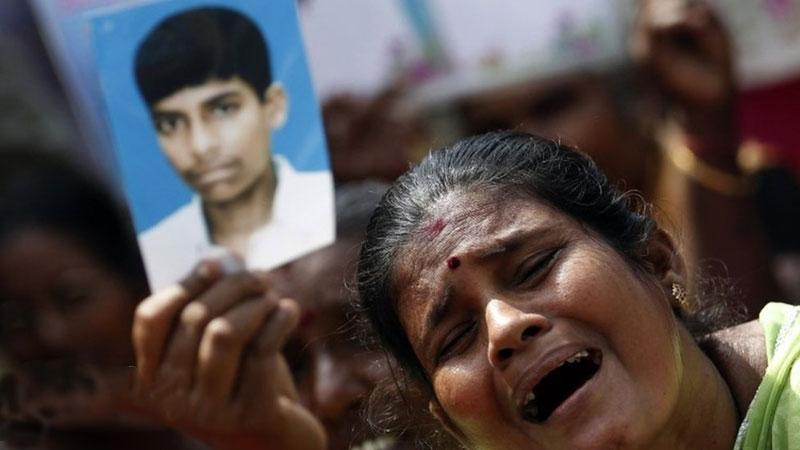
Reparations form one of the main pillars of Transitional Justice (TJ). Many people have a misconception that reparations include only financial compensation, however, this type of compensation is not the sole element of reparations. Reparations facilitate the acknowledgement of past abuses, rehabilitation of victims and restoration of the victim’s rights and dignity.
 Many victims across the country have been demanding reparations for decades. The Consultation Task Force Report (CTF Report) outlines these demands. Sri Lanka, as a democratic state, has a duty to acknowledge past abuses and to heal the wounds of the victims. Reparations are much more important in the post-war context as it has the ability to have the most tangible impact on victims. In addition, reparations can build trust among the public and the Government as the Government is capable of taking steps to redress past harms.
Many victims across the country have been demanding reparations for decades. The Consultation Task Force Report (CTF Report) outlines these demands. Sri Lanka, as a democratic state, has a duty to acknowledge past abuses and to heal the wounds of the victims. Reparations are much more important in the post-war context as it has the ability to have the most tangible impact on victims. In addition, reparations can build trust among the public and the Government as the Government is capable of taking steps to redress past harms.
“Reparations should be a priority. Finish it off”- Submission in the CTF report by Lay-religious group, Western Province.
Though the Rehabilitation of Persons, Properties and Industries Authority (REPPIA) is in place to provide financial compensation to conflict-affected people, it cannot be seen as a comprehensive body for reparations. In a country like Sri Lanka, which has experienced a number of riots/insurgencies and a brutal 30 year war, reparations are crucial.
Redress
Nevertheless, Sri Lanka has not had any comprehensive and permanent body for reparations though there were a few ad hoc and incomprehensive reparation attempts.
“I lost my three sons on the same day. They disappeared at the time of JVP insurgencies. I was helpless. I need reparations for my losses.”- Peligodagamage Babynona, a 84 year old mother has been waiting for reparations for 30 years and she still has hope.
“I don’t have my father to pay fees for me. If someone pays my tuition fees, I will be able to go for tuition and pass the scholarship examination…” - A 9 year-old girl pleads to the Government to help her continue her education.
Sri Lanka is committed to take measures to acknowledge the past and provide redress to the victims not only because of the 30/1 Resolution and the international pressure, but also it has an inherent duty to redress the victims and recognise the rights of its own citizens.
Thousands of families across the country are not able to meet their basic needs since they have lost their breadwinners, assets and livelihood opportunities during the past conflicts.
The current trend shows a spike in suicide rates due to poverty and indebtedness. Also, poverty negatively impacts education. In this context, reparations that include monetary compensation will have an immense effect.
In addition, there are a significant number of persons across the country who are traumatised due to the effects of war. They need psycho-social support to recover their selves.
“I feel very sorry for myself when I see loving couples at parents’ meetings. I always feel that I never had the chance of being loved by my husband.
I cry when I recall all the memories we shared when he was alive. It hurts me a lot and sometimes I want to die but I still think of my kids’ future rather than mine”- a military widow says. There are thousands of widowed mothers, girls subjected to abuses, and child victims for whom the psycho-social support is crucial. Reparations that include psycho-social support, therefore, is a timely requirement for Sri Lanka.
Myth on the notion of ‘Victim’
“The military widows are vulnerable in the post-war context. They are not provided with any reparations. They depend on the pensions of their husbands. Sometimes they are subject to sexual harassment due to their vulnerability.” – an activist.
The victims are not only considered as the Northern and Eastern Tamils, but also military widows, the victims of JVP insurgencies and victims of riots (such as Aluthgama, Digana).
The notion of the victim is often misunderstood and criticisms raised, but victim and victimhood do not belong to any particular race/religion. Any person who is affected by any civil disturbance, political unrest, conflict, riot, or the war can be identified as a victim regardless of his/her ethnic or religious identity.
There are thousands of military widows in the South, particularly in Kurunegala. These widowed mothers are helpless after the loss of their husbands. They depend solely on their husband’s pension scheme and the welfare scheme of the Government. In addition, there are other victims of riots, such as the Aluthgama riot and Kandy-Digana incident. Unfortunately, the notion of victimhood is misled by few for political advantages.
The Office for Reparations
In response to Sri Lanka’s constitutional duty, measures have been taken to establish an Office for Reparations. A Bill in this regard, titled “Office for Reparations Bill’’ (The Bill) was gazetted on June 25th 2018. The Bill was submitted to Parliament on July 18, 2018. The Office has a mandate to provide redress to all Sri Lankans who suffered harm/violations during the conflicts, riots, and the war.
The Office will function as an Independent Body. The Office is empowered to formulate, design, and implement policies on reparations. The policies will be implemented by the Office upon the approval of the Cabinet. The Office will take over the claims and the programmes of REPPIA.
“As citizens of Sri Lanka, which faced numerous violent conflicts in the past, we look forward to promote reconciliation and for which the reparations will be the good starting point.”
